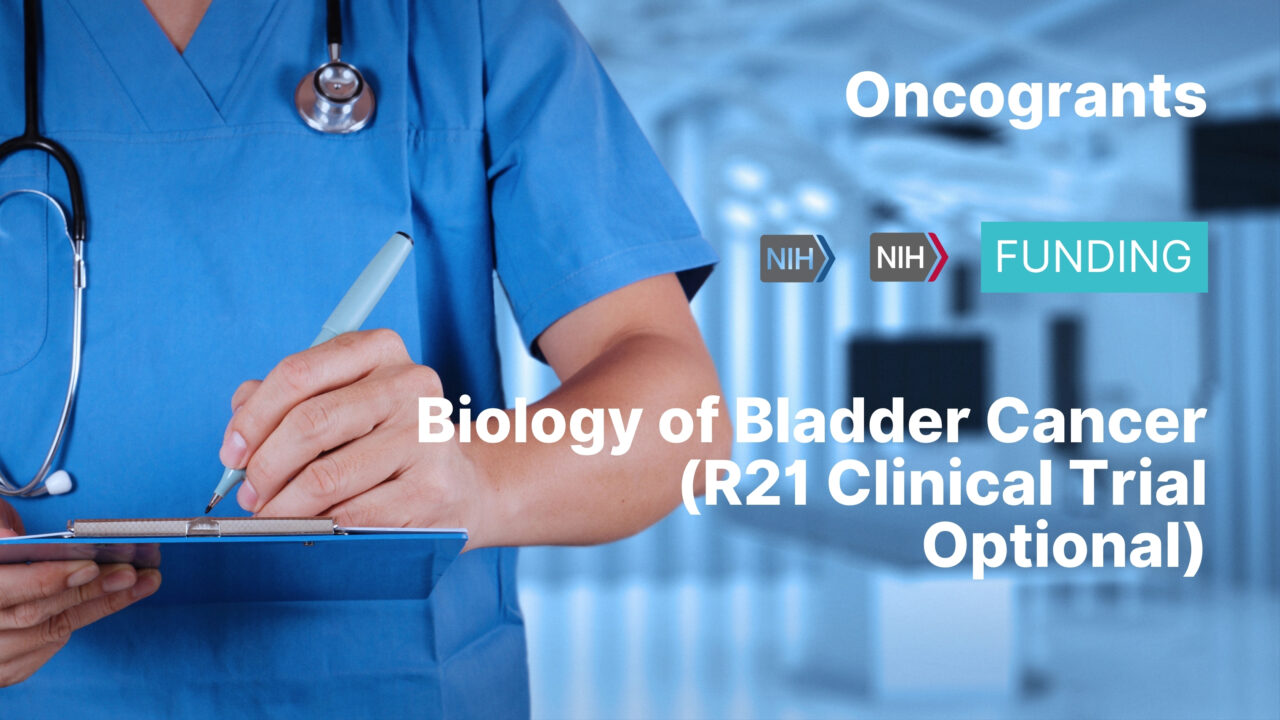R21 exploratory grants supporting studies on the molecular and cellular mechanisms driving bladder cancer initiation, progression, recurrence, and microenvironmental interactions. Clinical trials (especially early‐phase NMIBC interception) are allowed but must complement a strong biological focus. Projects should fill key knowledge gaps in normal bladder biology and tumorigenesis to inform future interventions.
Eligibility
-
Eligible entities (U.S. & foreign): Higher education institutions; nonprofits; for‐profits (including small businesses); state/local governments; tribal organizations; faith‐based/community organizations; regional organizations; non‐U.S. entities.
-
Investigators: Any qualified PD/PI(s) with eRA Commons account(s). Teams are encouraged to include co‐investigators with expertise outside bladder cancer (e.g., metabolism, immunology).
-
Project type: Limited to R21 (exploratory/developmental); clinical trials allowed but not primary focus; translational aims OK if paired with mechanistic studies.
Funding
-
Mechanism: R21 Exploratory/Developmental Research Grant (clinical trial optional)
-
Direct costs: ≤275,000 USD total over 2 years; ≤$200,000 in any single year
-
Project period: Up to 2 years
-
Estimated awards: Depends on appropriations and meritorious applications
Key Dates
-
Posted: November 20, 2024
-
Open (earliest submission): January 16, 2025
-
Letter of Intent: 30 days before application due date
-
Application due (standard NIH dates):
-
February 16, 2025, 5 PM local time
-
June 16, 2025, 5 PM local time
-
-
Review:
-
July 2025 (Feb cycle) → Advisory Council October 2025 → Earliest start December 2025
-
November 2025 (June cycle) → Advisory Council January 2026 → Earliest start April 2026
-
-
Expiration: September 08, 2025
Application Highlights
-
Budget: Total direct costs ≤$275K for 2-year period; itemize within R21 modular/budget guidelines.
-
Research Plan (6 pages for R21):
-
Significance: Define how project advances bladder cancer biology (e.g., normal bladder differentiation, tumor field effects, NMIBC progression, microenvironment, metabolism, microbiome, racial/sex disparities, or novel models).
-
Investigator(s): Justify team expertise; highlight co‐investigators with complementary skills outside bladder cancer.
-
Approach: Detail methods/models appropriate for mechanistic insights; if clinical trial is included (especially NMIBC), it must be ancillary to biological aims.
-
-
Resource & Data Sharing: Include a Data Management & Sharing Plan, and if generating large‐scale genomic data, address the NIH Genomic Data Sharing Policy.
-
Appendix: Only blank surveys/questionnaires allowed.
-
Human Subjects/Clinical Trials: Follow SF424 and PHS 398 instructions; include PHS Human Subjects forms and study records if applicable.
Contacts
-
Programmatic Queries (Biology/Tumor Biology):
-
Ron Johnson, Ph.D. | 240-276-6250 | rjohnso2@mail.nih.gov
-
Elisa Woodhouse, Ph.D. | 240-276-6220 | woodhousee@mail.nih.gov
-
-
Programmatic Queries (Prevention/Epidemiology):
-
Howard L. Parnes, M.D. (Prevention) | parnesh@nih.gov
-
Tram Kim Lam, Ph.D., M.P.H. (Epidemiology) | lamt@mail.nih.gov
-
-
GrantsInfo: GrantsInfo@nih.gov | 301-480-7075
-
Grants.gov Support: support@grants.gov | 800-518-4726


